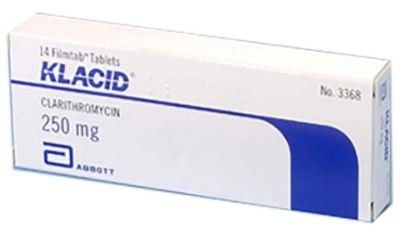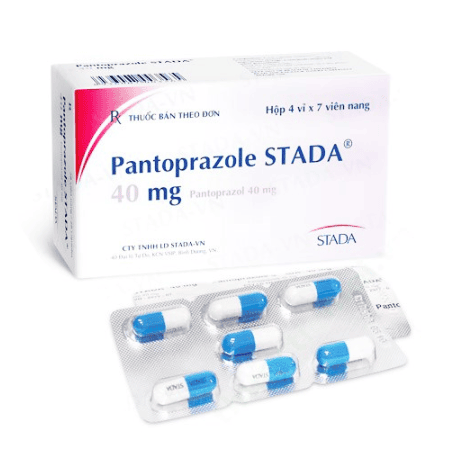This is an automatically translated article.
Currently, stomach diseases are increasing at a worrying rate. Especially when Helicobacter pylori bacteria are involved. The first solution that many patients as well as doctors choose is to prescribe a quick treatment and pain relief regimen. However, like using many other drugs, patients need to know the side effects of stomach medicine before using it.
1. Overview of stomach medicine
Stomach pills are commonly used to treat stomach upset, heartburn, nausea, and are sometimes also taken by many people quickly to treat or prevent diarrhea. Stomach medications work by slowing the growth of bacteria that can cause diarrhea. However, if the patient has signs of fever and sees blood or mucus in the stool, it should not be used without a doctor's prescription.
In some cases, the drug is also indicated in combination with some other drugs to treat stomach ulcers caused by Helicobacter pylori bacteria. Each stomach medicine may contain different ingredients that serve different purposes. Arbitrary use or misuse of products can bring about unwanted side effects.
2. Side effects of stomach medicine
Besides the obvious therapeutic benefits, bismuth subsalicylate (the active ingredient in stomach medicine) can cause some effects.
In fact, side effects of stomach medicine are not so common. The most common side effects are darkening of the stools and blackness of the tongue, most of which are harmless and go away once the person stops taking the medication.
In addition, some cases of stomach upset because of side effects such as vomiting, continuous diarrhea can cause the user's body to become severely dehydrated, causing weakness. Contact your doctor right away if you notice any of these signs of dehydration, such as: Unusual decrease in urination, dry mouth, increased thirst, rapid heartbeat or dizziness, lightheadedness.
Stomach medicine rarely causes serious internal bleeding. However, if you see signs such as: Vomiting that looks like coffee grounds, black stools, blood or mucus, stomach pain, taking stomach medicine with persistent abdominal pain, ... then stop taking the medicine and consult your doctor or pharmacist.
In short, some side effects of stomach medicine can be mentioned as:
Anxiety, stress; Tinnitus, hearing loss; Vision problems; Confusion ; Constipation (severe); Diarrhea (severe or persistent); Difficulty speaking or stuttering; Dizziness, lightheadedness; Drowsiness (severe); Fast or deep breathing; Increased sweating; headache (severe or constant); Frequent thirst; Low morale; Muscle spasms (especially in the face, neck and back); Muscle weakness, tremors; Nausea or vomiting (severe or persistent); Stomach pain (severe or persistent).

Dù không phổ biến, thuốc dạ dày vẫn có thể gây nên một số tác dụng phụ.
3. Notes before use
Before taking medicines containing Bismuth subsalicylate, tell your doctor if you are allergic to it, or to Aspirin, Salicycat (such as Salsalate), or to NSAIDs (such as Ibuprofen, Naproxen, Celecoxib) or any other condition. any other allergies.
Do not take stomach medicine if you have some special health problems. Before taking this medicine, consult your doctor if you have: Bleeding problems (such as hemophilia), bloody, black, tarry stools.
Stomach medicines may also contain Aspartame (sweetening additive) so for patients with phenylketonuria (PKU) or any condition that requires restriction of Aspartame or Phenylalanin consumption, consult consult a doctor before use. The stomach medicine may contain a compound similar to Aspirin (Salicylate) that children and adolescents should not take if they have chickenpox, flu or any undiagnosed illness. In these cases, taking aspirin or aspirin-like drugs can increase the risk of Reye's syndrome, a rare but very serious illness.
For patients with inflammatory bowel disease (IBD), drugs that can affect the gastrointestinal tract should be avoided. Some medications that can cause stomach problems include nonsteroidal anti-inflammatory drugs (NSAIDs), antacids, anticholinergics, and H2-receptor antagonists.
During the first 6 months of pregnancy, gastric medicine should only be used when absolutely necessary because it contains salicylate, not recommended in the last 3 months of pregnancy due to possible harm to the fetus and affect the transfer vaginal/normal birth. Discuss the benefits and side effects of stomach medications with your doctor before using them.

Trong 6 tháng đầu của thai kỳ, chỉ nên dùng thuốc dạ dày khi thật cần thiết.
Please dial HOTLINE for more information or register for an appointment HERE. Download MyVinmec app to make appointments faster and to manage your bookings easily.
References: drugs.com, lms.mrc.ac.uk, webmd.com, verywellhealth.com












